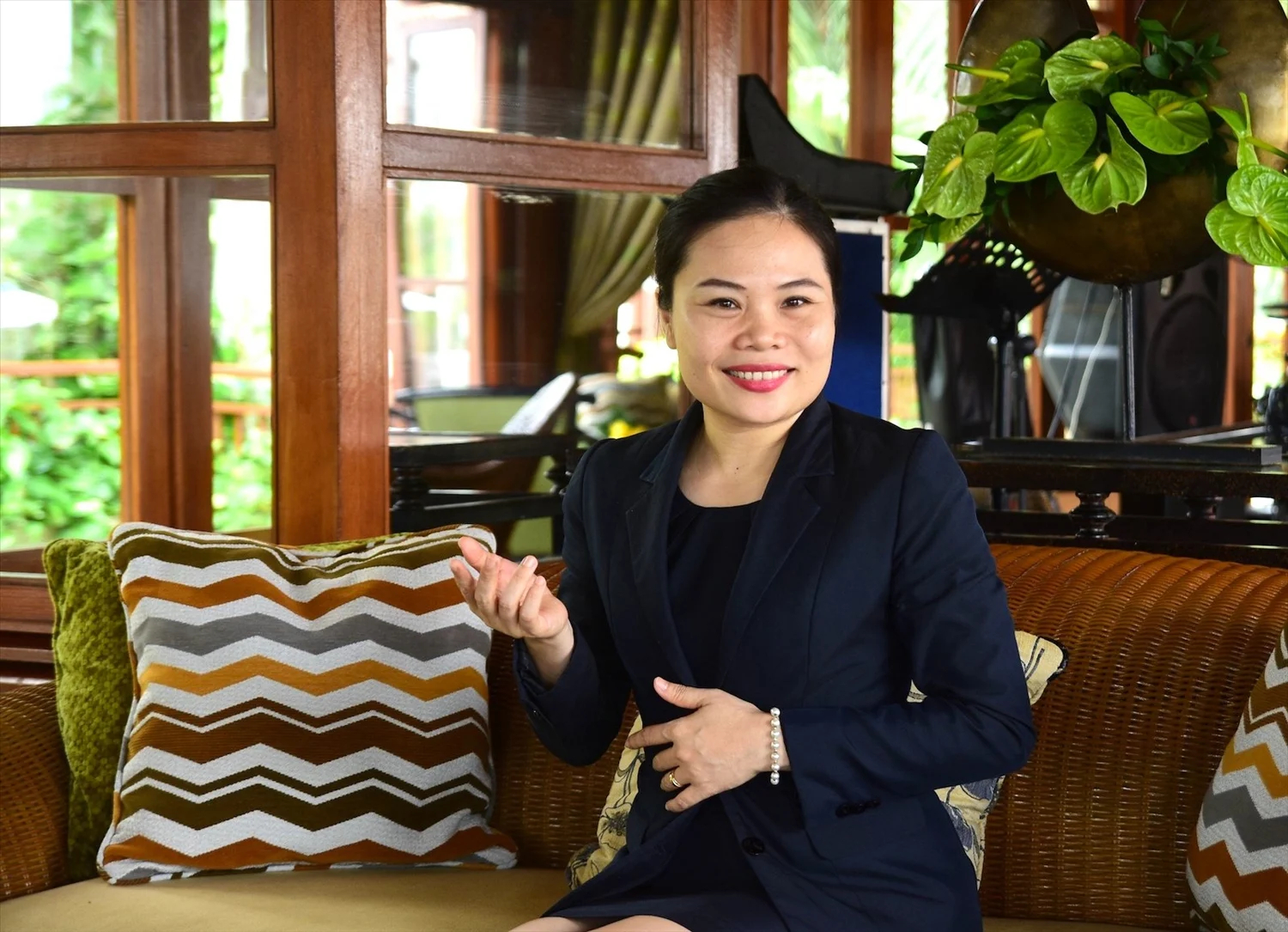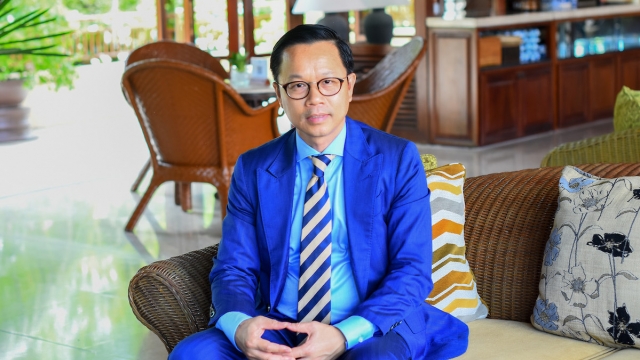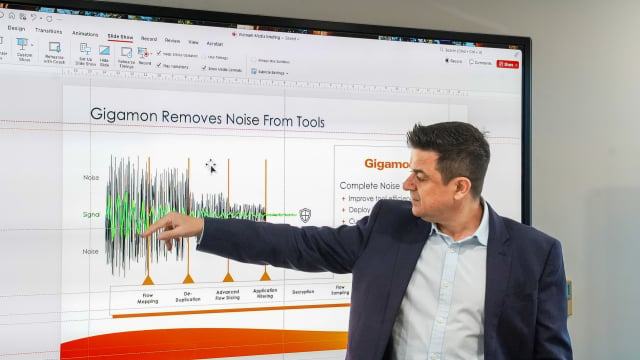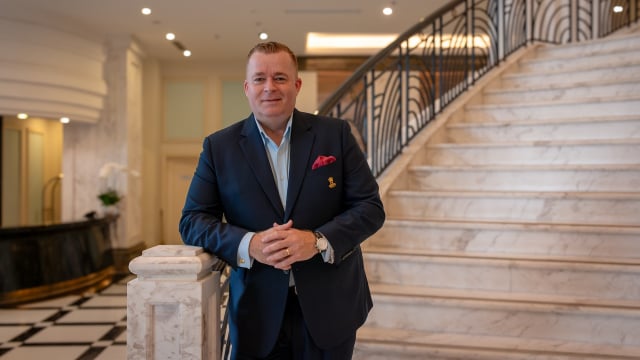Leader Talk
The secret to employee retention
As Furama-Ariyana Danang international tourism complex has just won the “Best Companies to Work for in Asia” HR Asia Awards 2024, TheLEADER talked with its HR and training director Nguyen Thi Minh Tam to find out more.
Furama Resort Danang used to be the only luxury beach resort in Central Vietnam, but now, hotels and resorts are popping up everywhere, increasing the demand for skilled labor. As the HR director of Furama, do you feel pressured when your staff is lured away by other companies?
Nguyen Thi Minh Tam: When the market expands, job opportunities abound, not only for our employees but also for myself. However, this growth also creates pressure because when opportunities arise, employees may leave. This is something we must learn to accept as it is the nature of the market.
However, we take pride in the fact that the market trusts the quality of Furama's workforce. Many of our former employees now hold management positions in other hotels. Some hotels even prioritize applications from candidates with Furama experience, which speaks volumes about Furama's reputation in the industry.
Have you ever received offers from other companies? What has kept you at Furama for 18 years?
Nguyen Thi Minh Tam: Of course, I have. But if I were to consider leaving now, my child would be very upset. The reason is that working at Furama allows my child to participate in various activities. For instance, during the summer, the children can join swimming lessons, learn self-rescue skills, and participate in many beach activities.
Additionally, on June 1st every year, Furama organizes activities for the employees' children. Our general director Nguyen Duc Quynh always says, "If we serve our guests well, why not serve our employees' children even better?"
Thus, International Children's Day at Furama is not only a time for children but also for the employees' families. There are many activities where the children of different departments can interact, bond, and compete with one another. The management also rewards those with high achievements or excellent grades. One year, the resort even held a competition for the children to express their thoughts about Furama through art and poetry, which they loved.

It seems that Furama is fostering a strong bond between the employees' families and the company, which in turn helps retain employees. Does the Furama Fabulous Card, issued to employees' families to use the resort's services, play a role in this?
Nguyen Thi Minh Tam: Absolutely. Each employee is issued a card to use Furama's services. The company loads money onto the card at specific times, such as birthdays, holidays, and the New Year.
The management's philosophy is that the card is not just for the employee but also for their family, especially the children, to enjoy the resort's services. It’s not just about having a drink or swimming; it's about experiencing the luxury, which leaves a lasting impression, especially on young children. It’s not merely about enjoyment but also about family bonding. That's why, if I were to leave now, my child would be very sad.
But salary and income are still among the most important factors for employees when they apply for jobs. Does Furama have a competitive advantage in this regard?
Nguyen Thi Minh Tam: After 18 years here, I can confidently say yes. Salary and benefits are always fundamental concerns for employees. Some other places might offer higher pay, but the biggest difference at Furama is stability.
I’ve noticed cases where people left for higher pay elsewhere, only to find themselves constantly worrying about when they would actually get paid. At Furama, salaries are always paid on a fixed date, or even earlier if it falls on a weekend, ensuring financial stability for our employees.
In addition, service charges, which are a significant source of income, are particularly strong at Furama compared to the market, making this a bright spot for recruitment. In some months, these service charges can be as high as the base salary.
Service charges are posted on the employee board, but the details are confidential to each individual. This number reflects the employee’s performance over the past month, so those who are more enthusiastic and do their job well will benefit more, encouraging a positive work ethic.
Besides stable salaries and high service charges, does Furama offer any special benefits to its employees?
Nguyen Thi Minh Tam: Recently, during an orientation session, a new employee mentioned being surprised that our staff changing rooms are air-conditioned and have music playing, which made everyone laugh. Newcomers find it surprising, but long-term employees at Furama see it as completely normal. Our staff showers are equipped with shampoo and body wash, which is not always the case at other places.
The management has also recently upgraded the entire staff changing area, as it relates to the comfort and safety of our employees. Additionally, there is a dedicated area for resting and for mothers to express milk. As both an HR professional and a mother, I find this incredibly heartening because not every place offers such amenities.
The employee dining area has also been recently upgraded. What motivated the company to invest in this area?
Nguyen Thi Minh Tam: The resort has many departments, some of which work outdoors in very hot conditions. The dining area is a place for them to rest and socialize. The management wanted to create the most comfortable space for employees to eat and relax, so they decided to upgrade and renovate it.
In fact, this area is no longer just a dining hall; it’s now referred to as the employee restaurant. The menu is planned two weeks in advance, posted on the employee board, and supervised by HR and a doctor.
There was even a campaign to name the restaurant, with all departments participating. The chosen name, "Bep Nha Minh" (Our Home Kitchen), reflects the cozy atmosphere where everyone feels like family. The kitchen and dining area are beautifully designed and comfortable, so it’s called a restaurant. It offers a full range of appetizers, main courses, desserts, coffee, and beverages, all free of charge, which the employees love.
Despite these great benefits, some employees still leave. How do you handle such situations as the HR manager?
Nguyen Thi Minh Tam: Furama has excellent policies to retain employees, which is why many have been with us for 10 to 20 years. I myself have been here for 18 years, working my way up from secretary, to assistant to the General Manager, to my current role as HR and Training Director. At other places, people might be proud to have worked for three years, but at Furama, five years is still considered new. We have many long-term employees. Furama must have a competitive advantage to keep staff for so long.
However, some employees still leave. When that happens, we conduct an exit interview, usually with an HR manager, but for management positions and above, I handle it personally.
The information from these conversations is kept confidential. We want to understand if there are areas we need to improve because, at that point, the departing employee has no reason to hold back. If there are any misunderstandings, we clarify them so that both parties can part on good terms.
You mentioned that HR work comes with significant pressure, yet it seems that Furama handles all issues smoothly, without any apparent pressure.
Nguyen Thi Minh Tam: There is pressure, and it’s quite intense. Furama’s entry standards are already high, and with the market competition due to the emergence of new hotels and the shortage of skilled labor, sometimes the new hires don't meet our expectations. But this is something HR professionals must accept, and we can't blame the training institutions because they face challenges, and each company has different needs.
We must accept and prepare by recruiting and training ourselves. We identify the essential skills employees must have, and any gaps are addressed through training. I’ve asked many employees, and I was surprised when they said they value companies with good training programs over salary.
Moreover, the biggest challenge is recruiting management-level staff. For lower-level employees, there’s no issue because they can start working right away. But when hiring for management, the candidate needs to fit in with the existing team and meet the group's needs.
You’ve been with Furama for 18 years, from when it was a foreign-owned five-star hotel to now being owned by a domestic investor. Have you noticed any changes in HR management during this transition?
Nguyen Thi Minh Tam: There’s often a mindset that when Vietnamese take over, they’ll cut costs. But fortunately, Furama’s new owners have maintained everything and only built upon it, which has sustained significant trust among employees and customers.
I think this is a blessing for the employees here and a key reason why Furama continues to be a leading beach resort not only in Central Vietnam but across the country.
The company continues to prioritize its people, making substantial investments in employee facilities like upgrading the dining area and issuing the cards, even though these require significant expenses. Employees were surprised when they learned about these decisions, but the management is determined to do things thoroughly and do them well for their employees.
Leaders must embrace fear
Vietnam turns semiconductor vision into action
The global semiconductor industry is being reshaped by geopolitical tensions, shifting supply chains, and the surge of digital technologies.
Cutting red tape in APA approvals to speed up tax negotiations
The change in APA approval authority is expected to shorten processing time and enhance business proactiveness in international tax negotiations.
Enterprise cybersecurity is under threat from the inside
As hybrid cloud systems grow more complex, Vietnamese enterprises are struggling to detect cybersecurity threats moving laterally within their own networks.
Breakthrough for the international financial center ambition
The submission of the draft resolution on Vietnam’s international financial center to the National Assembly heralds a new developmental era for the country.
How leadership philosophy redefines hospitality in Nha Trang
More than just running a 5-star resort, Kristian Petersen is redefining the art of hospitality with a humane and sustainable leadership philosophy.
When organic becomes an inspiring wellbeing lifestyle
For Tyna Huynh, co-founder of Drinkizz, organic is not just a food choice but a way of life that fosters a deep connection between people, nature and community.











































